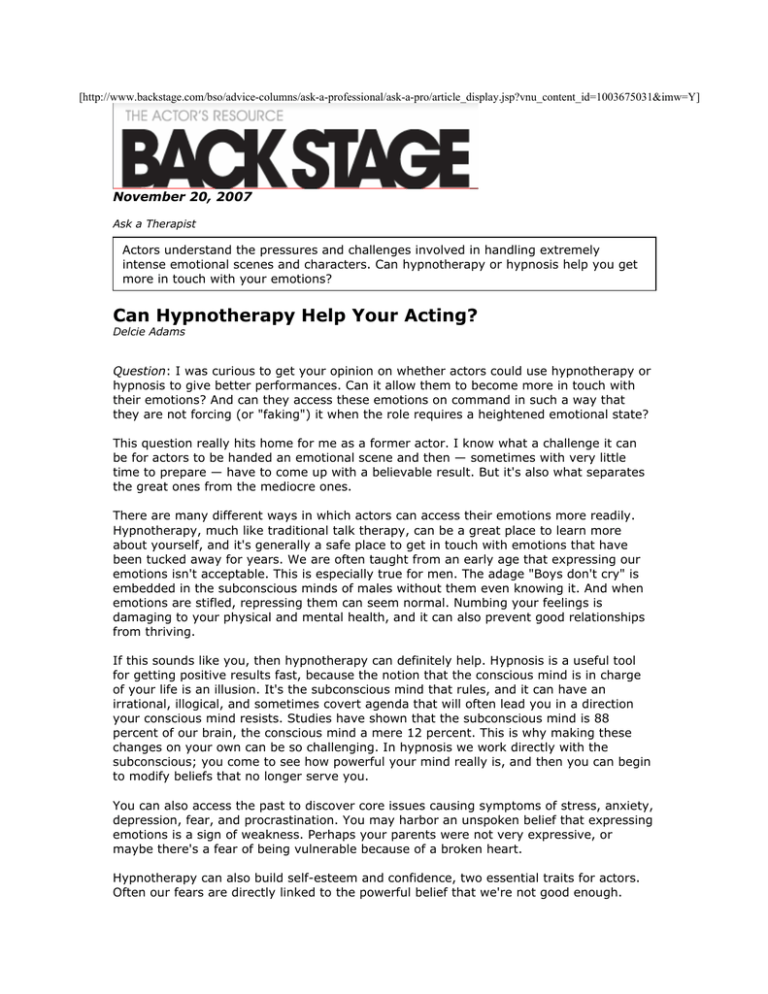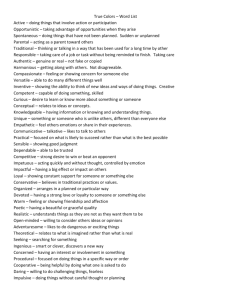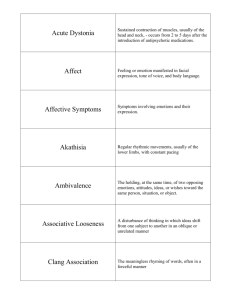Document 13959462
advertisement

[http://www.backstage.com/bso/advice-columns/ask-a-professional/ask-a-pro/article_display.jsp?vnu_content_id=1003675031&imw=Y] November 20, 2007 Ask a Therapist Actors understand the pressures and challenges involved in handling extremely intense emotional scenes and characters. Can hypnotherapy or hypnosis help you get more in touch with your emotions? Can Hypnotherapy Help Your Acting? Delcie Adams Question: I was curious to get your opinion on whether actors could use hypnotherapy or hypnosis to give better performances. Can it allow them to become more in touch with their emotions? And can they access these emotions on command in such a way that they are not forcing (or "faking") it when the role requires a heightened emotional state? This question really hits home for me as a former actor. I know what a challenge it can be for actors to be handed an emotional scene and then — sometimes with very little time to prepare — have to come up with a believable result. But it's also what separates the great ones from the mediocre ones. There are many different ways in which actors can access their emotions more readily. Hypnotherapy, much like traditional talk therapy, can be a great place to learn more about yourself, and it's generally a safe place to get in touch with emotions that have been tucked away for years. We are often taught from an early age that expressing our emotions isn't acceptable. This is especially true for men. The adage "Boys don't cry" is embedded in the subconscious minds of males without them even knowing it. And when emotions are stifled, repressing them can seem normal. Numbing your feelings is damaging to your physical and mental health, and it can also prevent good relationships from thriving. If this sounds like you, then hypnotherapy can definitely help. Hypnosis is a useful tool for getting positive results fast, because the notion that the conscious mind is in charge of your life is an illusion. It's the subconscious mind that rules, and it can have an irrational, illogical, and sometimes covert agenda that will often lead you in a direction your conscious mind resists. Studies have shown that the subconscious mind is 88 percent of our brain, the conscious mind a mere 12 percent. This is why making these changes on your own can be so challenging. In hypnosis we work directly with the subconscious; you come to see how powerful your mind really is, and then you can begin to modify beliefs that no longer serve you. You can also access the past to discover core issues causing symptoms of stress, anxiety, depression, fear, and procrastination. You may harbor an unspoken belief that expressing emotions is a sign of weakness. Perhaps your parents were not very expressive, or maybe there's a fear of being vulnerable because of a broken heart. Hypnotherapy can also build self-esteem and confidence, two essential traits for actors. Often our fears are directly linked to the powerful belief that we're not good enough. These fears are like sediment; they smother the skills necessary to improve our abilities and be the best we can be. As soon as we walk on stage or into a room with a casting director, they creep up and kill a good performance or audition. Doubt is one of our biggest enemies. You might be a veteran actor, but if you don't believe in your gift, then the other folks in the room won't either. Hypnotherapy can also teach you how to visualize with strong intention. Proper visualization techniques help eliminate self-doubt, allowing you to become more emotionally available. Think of hypnosis as a method of exfoliating layer upon layer of dirt that has built up over time and inhibits you from reaching your full potential as a performer. But the truth is that therapy alone can't give you the ability to employ an array of emotions at the drop of a hat. It's imperative that you find a good acting coach. Most successful actors spend a great deal of time learning their craft. Acting isn't about looking happy, sad, or angry; it's about learning how to convey those emotions just as you would in everyday life. And I've known quite a few acting teachers who recommend therapy to some of their students to help unleash their emotions, allowing them to be used honestly. The more comfortable you are with these feelings, the easier it will be to draw upon them on stage. And though your question primarily concerns performance, it's important to note that the business of acting is a whole other animal to contend with, and it should not be dealt with lightly. While the art of acting requires truth and emotional accessibility, the business side involves other faculties, not least of which is patience. Although hypnotherapy will never take the place of a great acting teacher, it can do more than simply guide you through the complex process of improving your talent; it can also give you the motivation and determination to maintain the pursuit of your dream. Delcie Adams has a B.A. in theatre from San Francisco State University and is a certified hypnotherapist with a practice in Los Angeles. She's a member of the American Hypnosis Association and the Hypnotherapists Union Local 472. You can visit her website at www.delcieadams.com.






